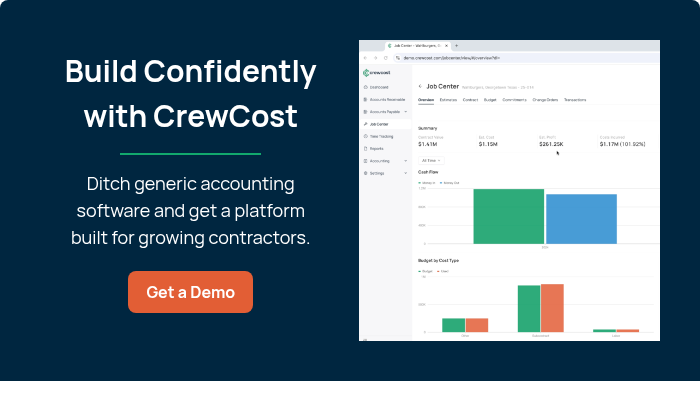If you’re a construction contractor working on federally funded, and even some private projects, you’re going to encounter what’s called “certified payroll”. It can be a complicated process, but we’ll walk you through everything you need to know: what it is, what’s required and common mistakes to avoid.
Key Takeaways
- Certified payroll is required on all federally funded construction jobs and some private projects.
- It is part of the requirements in the Davis-Bacon act and is intended to make sure workers are receiving fair wages.
- If you are growing your construction business, you will likely encounter certified payroll at some point.
What is Certified Payroll?
Certified payroll is part of the requirements set out in the Davis-Bacon act and is intended to make sure workers are getting paid fair wages. It requires a regular (most often weekly) report to be sent to the owner to prove how the funds were used and that workers were compensated fairly.
While certified payroll is required for all federally funded jobs, there are some jobs that are not federally funded that still have a requirement for certified payroll reports. So, it’s a good idea to understand this reporting requirement whether you use it on a regular basis or not because you are likely to encounter it as you grow your construction company.
What Needs to Be Included?
There are several requirements when submitting a certified payroll. At a minimum, it must contain:
- Employee name, address, and full social security number
- Job classification
- Hourly rate of pay and fringe benefits
- Number of regular and overtime hours worked each day
- Gross wages earned
- Any deductions taken out
- Actual wages paid for the week
The records must also indicate if any fringe benefits are paid as cash. Contractors must maintain the original records and make them available upon request.
WH-347
The report form used most often to certified payrolls is the WH-347. It is available through the Department of Labor or you can access it here. The WH-347 shows all of the information we have listed above for all employees to make your reporting easier on the jobs which require it. Many state and federal construction jobs will require the WH-347 or its equivalent for certified payroll reporting.
Submitting and Retaining Payroll
Most government contracts require certified payrolls to be submitted on a weekly basis and are typically due within 7 days of the end of the payroll period. Contractors must keep payroll records for at least 3 years after the completion of the project. Failing to submit certified payrolls or keeping inaccurate records can lead to payment delays or contract termination.
If you are a general contractor you will most often gather all the certified payroll reports from the subcontractors you use on a job and provide them to the owner for reporting purposes. Occasionally, as a general contractor you will have the subcontractor submit the certified payroll reports directly to an owner. If you do this you need to have the subcontractor copy you on their submission to ensure all documentation has been provided correctly to make getting paid on payment applications easier. If you are a subcontractor and use additional subcontractors to perform your scope of work you need to follow the same procedures as a general contractor would with the lower level subcontractor’s certified payroll submission.
Common Mistakes
Since most contractors aren’t dealing with federally-funded projects all the time, it’s easy to miss some of the requirements. Avoid these common mistakes when submitting certified payrolls:
- Forgetting to sign and certify the records
- Illegible or incomplete employee information
- Not reconciling hours worked with pay received
- Excluding fringe benefits if applicable
- Submitting late or not at all
Failing to submit complete and correct certified payrolls can result in a termination of your contract, fines and the inability to win future federal contracts.
An experienced payroll professional or construction accountant can review your records prior to submission to help you avoid errors. On top of that, keeping all your time tracking records organized will help make meeting the requirements of certified payroll much easier.
Further Reading:

